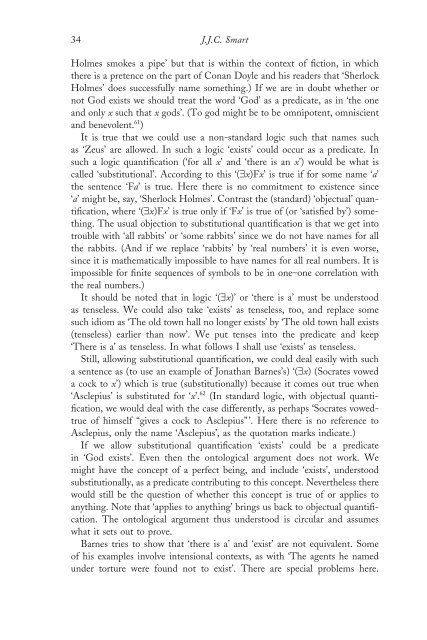Atheism and Theism JJ Haldane - Common Sense Atheism
Atheism and Theism JJ Haldane - Common Sense Atheism
Atheism and Theism JJ Haldane - Common Sense Atheism
Create successful ePaper yourself
Turn your PDF publications into a flip-book with our unique Google optimized e-Paper software.
34 J.J.C. Smart<br />
Holmes smokes a pipe’ but that is within the context of fiction, in which<br />
there is a pretence on the part of Conan Doyle <strong>and</strong> his readers that ‘Sherlock<br />
Holmes’ does successfully name something.) If we are in doubt whether or<br />
not God exists we should treat the word ‘God’ as a predicate, as in ‘the one<br />
<strong>and</strong> only x such that x gods’. (To god might be to be omnipotent, omniscient<br />
<strong>and</strong> benevolent. 61 )<br />
It is true that we could use a non-st<strong>and</strong>ard logic such that names such<br />
as ‘Zeus’ are allowed. In such a logic ‘exists’ could occur as a predicate. In<br />
such a logic quantification (‘for all x’ <strong>and</strong> ‘there is an x’) would be what is<br />
called ‘substitutional’. According to this ‘(∃x)Fx’ is true if for some name ‘a’<br />
the sentence ‘Fa’ is true. Here there is no commitment to existence since<br />
‘a’ might be, say, ‘Sherlock Holmes’. Contrast the (st<strong>and</strong>ard) ‘objectual’ quantification,<br />
where ‘(∃x)Fx’ is true only if ‘Fx’ is true of (or ‘satisfied by’) something.<br />
The usual objection to substitutional quantification is that we get into<br />
trouble with ‘all rabbits’ or ‘some rabbits’ since we do not have names for all<br />
the rabbits. (And if we replace ‘rabbits’ by ‘real numbers’ it is even worse,<br />
since it is mathematically impossible to have names for all real numbers. It is<br />
impossible for finite sequences of symbols to be in one–one correlation with<br />
the real numbers.)<br />
It should be noted that in logic ‘(∃x)’ or ‘there is a’ must be understood<br />
as tenseless. We could also take ‘exists’ as tenseless, too, <strong>and</strong> replace some<br />
such idiom as ‘The old town hall no longer exists’ by ‘The old town hall exists<br />
(tenseless) earlier than now’. We put tenses into the predicate <strong>and</strong> keep<br />
‘There is a’ as tenseless. In what follows I shall use ‘exists’ as tenseless.<br />
Still, allowing substitutional quantification, we could deal easily with such<br />
a sentence as (to use an example of Jonathan Barnes’s) ‘(∃x) (Socrates vowed<br />
a cock to x’) which is true (substitutionally) because it comes out true when<br />
‘Asclepius’ is substituted for ‘x’. 62 (In st<strong>and</strong>ard logic, with objectual quantification,<br />
we would deal with the case differently, as perhaps ‘Socrates vowedtrue<br />
of himself “gives a cock to Asclepius”’. Here there is no reference to<br />
Asclepius, only the name ‘Asclepius’, as the quotation marks indicate.)<br />
If we allow substitutional quantification ‘exists’ could be a predicate<br />
in ‘God exists’. Even then the ontological argument does not work. We<br />
might have the concept of a perfect being, <strong>and</strong> include ‘exists’, understood<br />
substitutionally, as a predicate contributing to this concept. Nevertheless there<br />
would still be the question of whether this concept is true of or applies to<br />
anything. Note that ‘applies to anything’ brings us back to objectual quantification.<br />
The ontological argument thus understood is circular <strong>and</strong> assumes<br />
what it sets out to prove.<br />
Barnes tries to show that ‘there is a’ <strong>and</strong> ‘exist’ are not equivalent. Some<br />
of his examples involve intensional contexts, as with ‘The agents he named<br />
under torture were found not to exist’. There are special problems here.

















